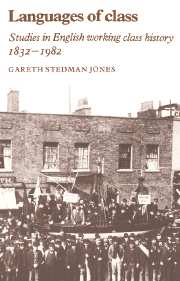Book contents
- Frontmatter
- Contents
- Acknowledgements
- Introduction
- 1 Class struggle and the Industrial Revolution
- 2 Class expression versus social control? A critique of recent trends in the social history of ‘leisure’
- 3 Rethinking Chartism
- 4 Working-class culture and working-class politics in London, 1870–1900: Notes on the remaking of a working class
- 5 Why is the Labour Party in a mess?
- Index
3 - Rethinking Chartism
Published online by Cambridge University Press: 08 January 2010
- Frontmatter
- Contents
- Acknowledgements
- Introduction
- 1 Class struggle and the Industrial Revolution
- 2 Class expression versus social control? A critique of recent trends in the social history of ‘leisure’
- 3 Rethinking Chartism
- 4 Working-class culture and working-class politics in London, 1870–1900: Notes on the remaking of a working class
- 5 Why is the Labour Party in a mess?
- Index
Summary
Who were the Chartists? The Chartists' own view was stated by Thomas Duncombe, introducing the 1842 Petition: ‘those who were originally called radicals and afterwards reformers, are called Chartists’. But this was never accepted by the great bulk of contemporary opinion. From the moment that Chartism first emerged as a public movement, what seized the imagination of contemporaries were not the formally radical aims and rhetoric of its spokesmen, but the novel and threatening social character of the movement. A nation-wide independent movement of the ‘working classes’ brandishing pikes in torchlight meetings in pursuit of its ‘rights’ was an unprecedented event and, whatever Chartism's official self-identity, contemporary observers could not refrain from projecting onto it deeper, unavowed motives and sentiments. Thomas Carlyle's distinction between the ‘distracted incoherent embodiment of Chartism’ and its ‘living essence … the bitter discontent grown fierce and mad, the wrong condition therefore or the wrong disposition, of the Working Classes of England’, with its implied gulf between the real and formal definition of Chartism, set the terms of the predominant response, whatever the precise definition given to these terms. Chartists in vain protested their respect for property. Macaulay, debating the 1842 Petition, deduced the Chartist position on property from the social composition of its constituency. To accept the Petition would be to commit government to a class which would be induced ‘to commit great and systematic inroads against the security of property. How is it possible that according to the principles of human nature, if you give them this power, it would not be used to its fullest extent?’ Even the more sympathetic middle-class observers virtually ignored the political case of the Chartists.
- Type
- Chapter
- Information
- Languages of ClassStudies in English Working Class History 1832–1982, pp. 90 - 178Publisher: Cambridge University PressPrint publication year: 1984
- 38
- Cited by



